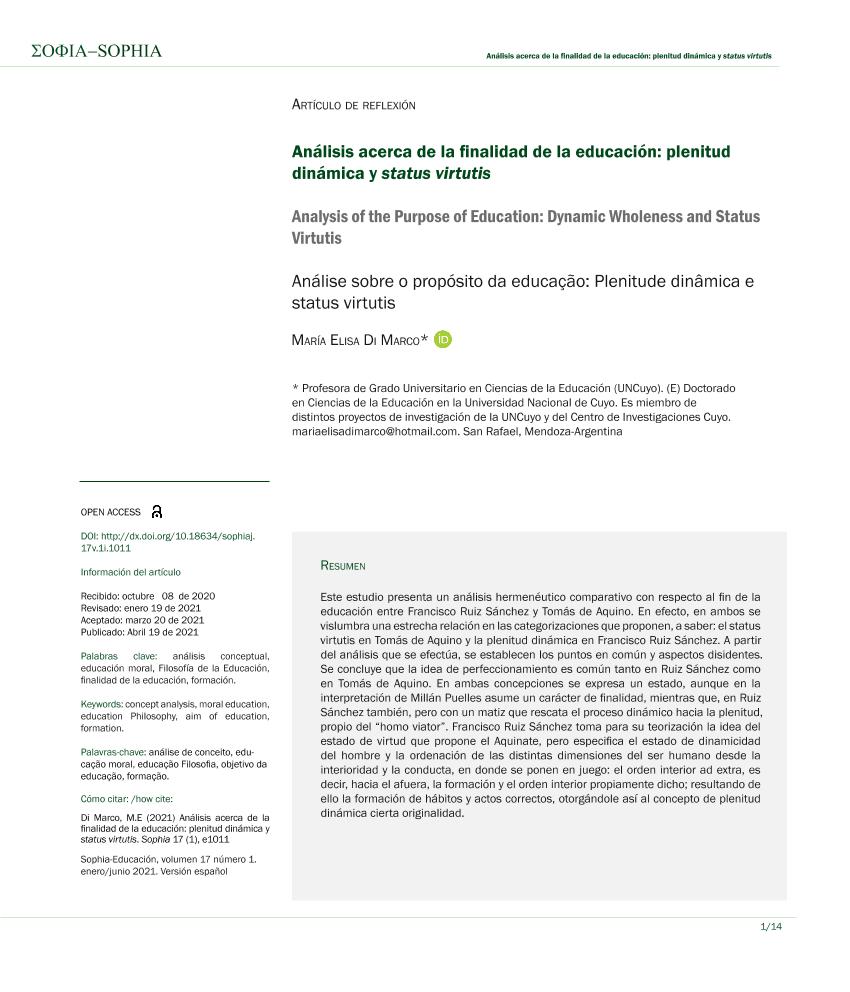Mostrar el registro sencillo del ítem
dc.contributor.author
Di Marco, María Elisa

dc.date.available
2022-01-20T10:15:24Z
dc.date.issued
2021-04
dc.identifier.citation
Di Marco, María Elisa; Análisis acerca de la finalidad de la educación: plenitud dinámica y status virtutis; Universidad La Gran Colombia; Sophia; 17; 1; 4-2021; 1-14
dc.identifier.issn
2346-0806
dc.identifier.uri
http://hdl.handle.net/11336/150368
dc.description.abstract
Este estudio presenta un análisis hermenéutico comparativo con respecto al fin de laeducación entre Francisco Ruiz Sánchez y Tomás de Aquino. En efecto, en ambos sevislumbra una estrecha relación en las categorizaciones que proponen, a saber: el statusvirtutis en Tomás de Aquino y la plenitud dinámica en Francisco Ruiz Sánchez. A partirdel análisis que se efectúa, se establecen los puntos en común y aspectos disidentes.Se concluye que la idea de perfeccionamiento es común tanto en Ruiz Sánchez comoen Tomás de Aquino. En ambas concepciones se expresa un estado, aunque en lainterpretación de Millán Puelles asume un carácter de finalidad, mientras que, en RuizSánchez también, pero con un matiz que rescata el proceso dinámico hacia la plenitud,propio del ?homo viator?. Francisco Ruiz Sánchez toma para su teorización la idea delestado de virtud que propone el Aquinate, pero especifica el estado de dinamicidaddel hombre y la ordenación de las distintas dimensiones del ser humano desde lainterioridad y la conducta, en donde se ponen en juego: el orden interior ad extra, esdecir, hacia el afuera, la formación y el orden interior propiamente dicho; resultando deello la formación de hábitos y actos correctos, otorgándole así al concepto de plenituddinámica cierta originalidad.
dc.description.abstract
This study presents a comparative hermeneutical analysis regarding the purpose of education between Francisco Ruiz Sánchez and Thomas Aquinas. Indeed, a close relationship can be glimpsed in both of them in the categorizations they propose, namely: the status virtutis in Thomas Aquinas and the dynamic fullness in Francisco Ruiz Sánchez. From the analysis carried out, the issues in common and dissenting aspects are established. It is concluded that the idea of perfection is common to both Ruiz Sanchez and Thomas Aquinas. In both conceptions a state is expressed: in the interpretation of Millán Puelles a character of finality is assumed, while in that of Ruiz Sánchez a nuance that rescues the dynamic process towards fullness, proper of the “homo viator” is perceived. Francisco Ruiz Sánchez takes for his theorization the idea of the state of virtue proposed by Aquinas. However, he specifies the state of dynamicity of man and the ordering of the different dimensions of the human being from the interiority and conduct, where the following come into play: the interior order ad extra, that is, towards the outside; the formation and the interior order itself. This results in the formation of correct habits and acts, thus giving the concept of dynamic wholeness a certain originality.
dc.format
application/pdf
dc.language.iso
spa
dc.publisher
Universidad La Gran Colombia
dc.rights
info:eu-repo/semantics/openAccess
dc.rights.uri
https://creativecommons.org/licenses/by-nc-sa/2.5/ar/
dc.subject
FINALIDAD DE LA EDUCACIÓN
dc.subject
PLENITUD DINÁMICA
dc.subject
STATUS VIRTUTIS
dc.subject
FRANCISCO RUIZ SÁNCHEZ
dc.subject.classification
Otras Ciencias de la Educación

dc.subject.classification
Ciencias de la Educación

dc.subject.classification
CIENCIAS SOCIALES

dc.title
Análisis acerca de la finalidad de la educación: plenitud dinámica y status virtutis
dc.title
Analysis of the purpose of education: dynamic wholeness and status
virtutis
dc.title
Análise sobre o propósito da educação: plenitude dinâmica e
status virtutis
dc.type
info:eu-repo/semantics/article
dc.type
info:ar-repo/semantics/artículo
dc.type
info:eu-repo/semantics/publishedVersion
dc.date.updated
2022-01-06T14:54:40Z
dc.journal.volume
17
dc.journal.number
1
dc.journal.pagination
1-14
dc.journal.pais
Colombia

dc.journal.ciudad
Bogotá
dc.description.fil
Fil: Di Marco, María Elisa. Universidad Nacional de Cuyo; Argentina. Consejo Nacional de Investigaciones Científicas y Técnicas. Centro Científico Tecnológico Conicet - Mendoza; Argentina
dc.journal.title
Sophia
dc.relation.alternativeid
info:eu-repo/semantics/altIdentifier/url/https://revistas.ugca.edu.co/index.php/sophia/issue/view/74
dc.relation.alternativeid
info:eu-repo/semantics/altIdentifier/url/https://revistas.ugca.edu.co/index.php/sophia/article/view/1011/1624
Archivos asociados
